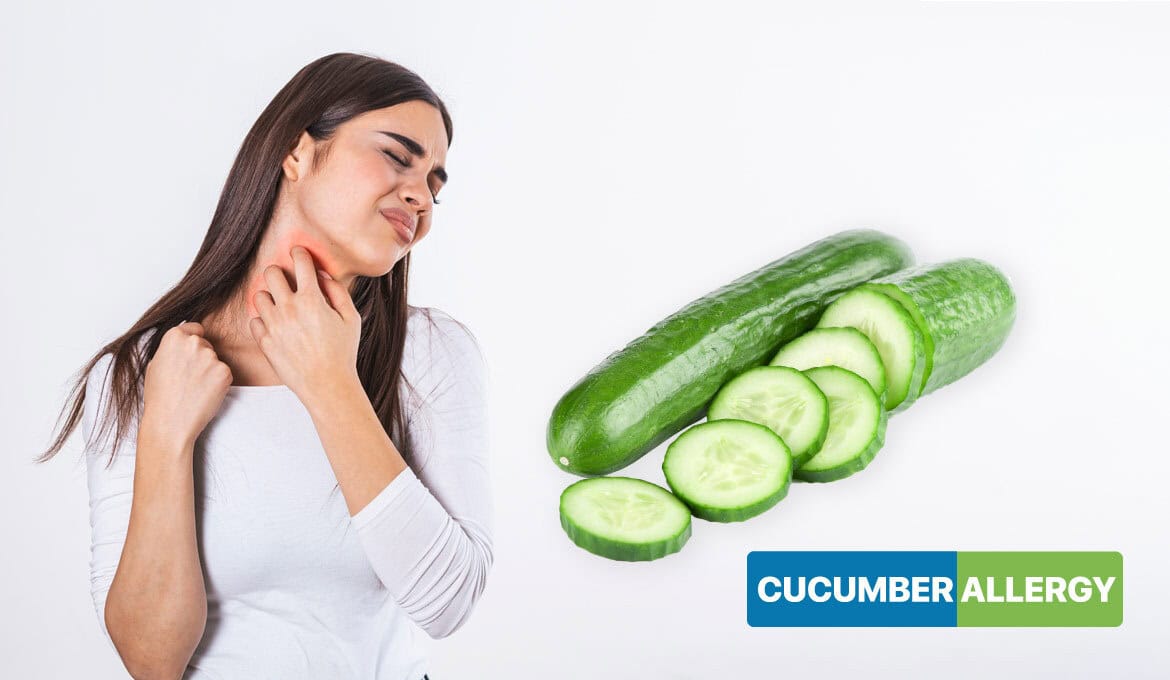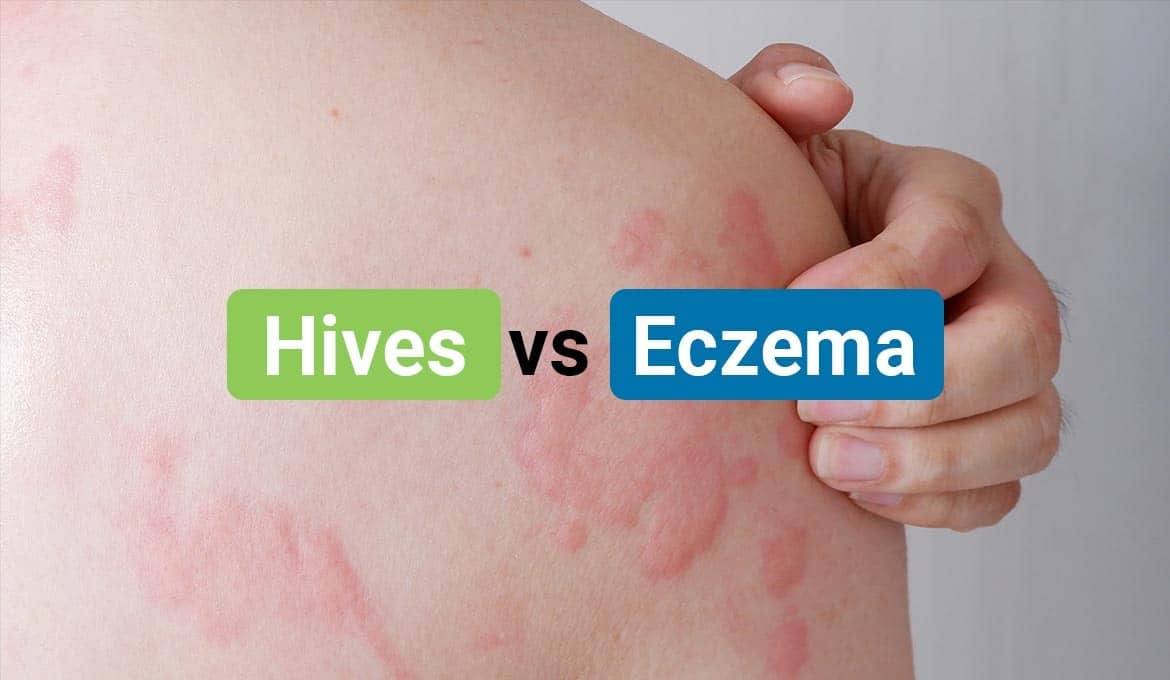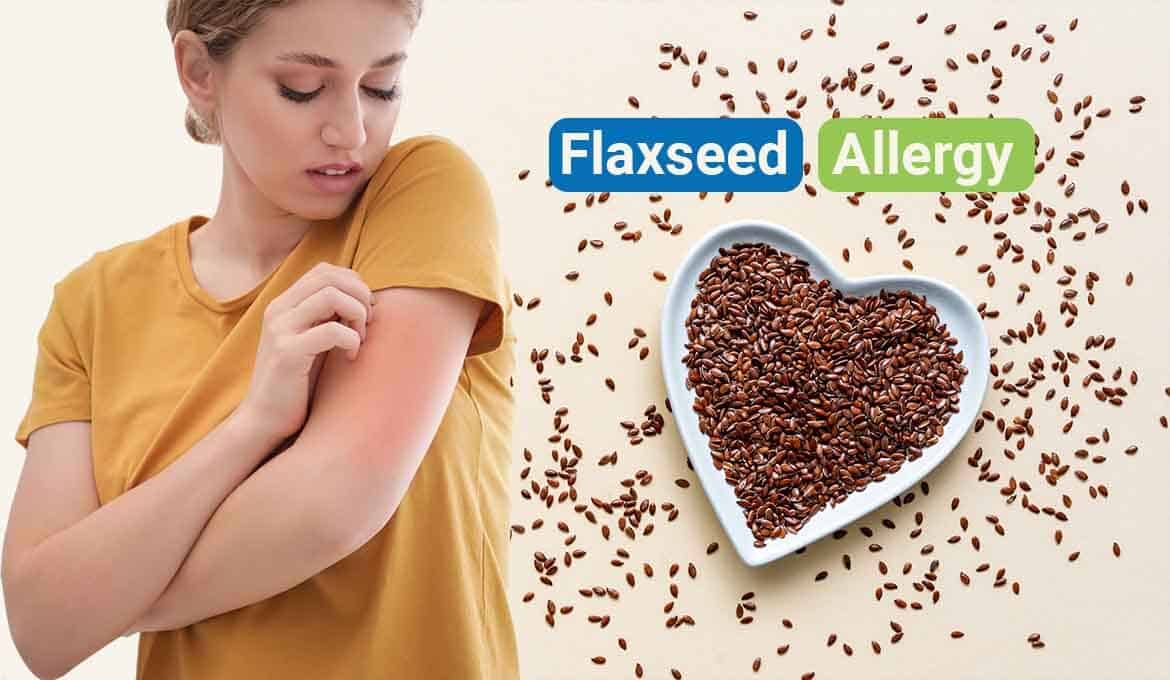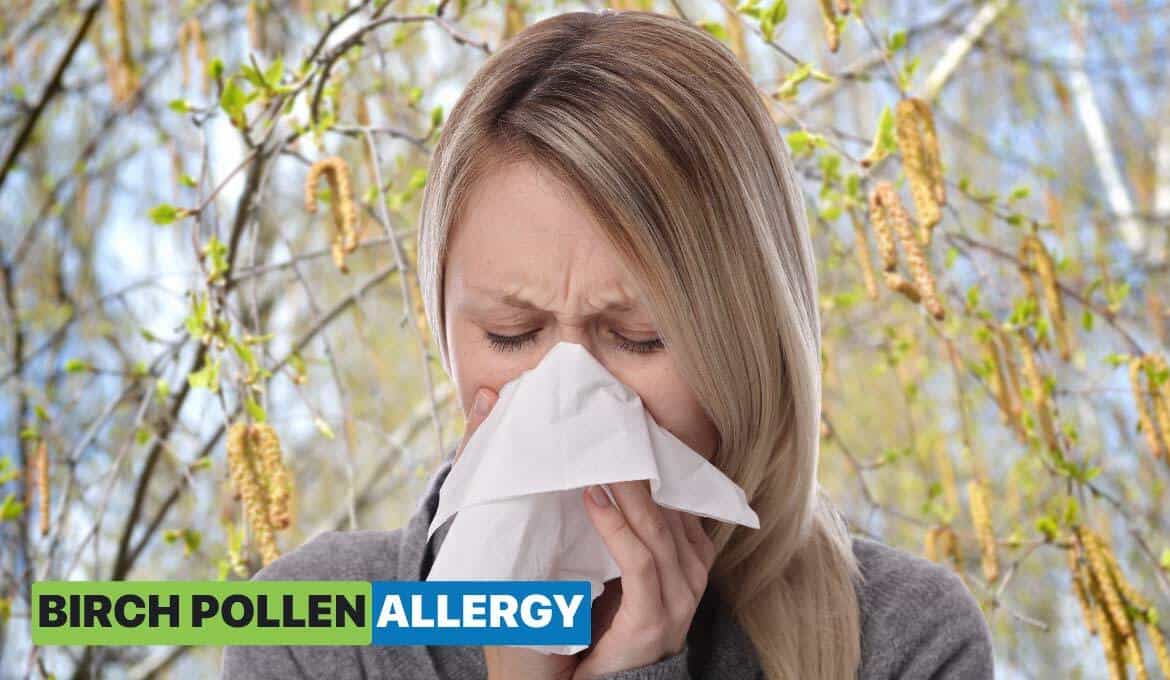
Food allergies can happen to people of any age and adversely affect human health. Many people worldwide are prone to food allergies. But have you heard of cucumber allergy? This allergy rarely occurs in people, but it can be challenging to cure when it happens. Though cucumber is a healthy food, it still comes with allergies for some people.
Here, we will explore everything you need to know about cucumber allergy, including its symptoms, causes, prevention, treatments, and more. Read on!
What Are Cucumbers?
Cucumbers are crisp, green, crunchy, long cylindrical, and non-starchy vegetables with mild and cool flavors cultivated and sold internationally and originating across Southeast Asia.
The scientific name for cucumber is Cucumis sativus. On average, Americans alone consume 12 pounds of cucumbers per person per year. Other names for cucumbers are Gherkins, Cukes, and Cowcumbers.
Symptoms of Cucumber Allergy
Cucumber allergic reactions are similar to allergic reactions to other foods. Reaction and severity are based on the amount consumed and other factors. Some common cucumber allergy symptoms are mentioned below:
- Skin Reactions: The occurrence of rashes is a common symptom of cucumber allergy. These rashes are red, itchy, and raised bumps that are swollen and warm.
- Oral Allergy Syndrome: Another symptom of cucumber allergy is an itchy or tingling sensation in the mouth or throat called oral allergy syndrome. The cross-connectivity between cucumber proteins and some pollens like birch pollen can cause this condition.
- Gastrointestinal Distress: Some people may experience gastrointestinal/digestive pain or discomfort, such as nausea, abdominal pain, diarrhea, or vomiting.
- Respiratory Issues: If the allergy is severe, it can lead to respiratory symptoms like wheezing, coughing, problems in breathing, chest tightness, or even anaphylaxis.
- Anaphylaxis: Cucumber allergy may lead to anaphylaxis in most severe and rare cases. Anaphylaxis is a severe life-threatening condition in which people face difficulty breathing and blood pressure drops that require immediate medical attention.
These symptoms can occur due to fiber and seeds of cucumber. However cucumber offers many health benefits, but some people can be allergic to cucumber. So, now let us know the causes of cucumber allergy.
Causes of Cucumber Allergy
A reaction to proteins in cucumbers causes cucumber allergy. When the body comes into contact with these proteins, it releases chemicals that cause the symptoms of an allergic reaction. These are generally IgE-mediated reactions.
1. Cucumber Sensitivity:
Cucumbers can cause non-IgE hypersensitivity symptoms. Food sensitivities may contribute to various conditions like:
- Atopic Dermatitis.
- ADD/ADHD.
- Cyclic Vomiting Syndrome.
- Depression or Migraine.
- Diarrhea.
- Autism Spectrum Disorders.
- Chronic Fatigue Syndrome.
- Epilepsy.
- Fibromyalgia.
- Inflammatory Arthritis.
- Insomnia.
- GERD.
- Interstitial Cystitis.
- Polycystic Ovarian Syndrome.
- Irritable Bowel Syndrome.
- Restless Leg Syndrome.
- Psoriasis.
- Urticaria (Hives).
2. Cucumber Intolerance:
Food intolerances are reactions to food that when the body is unable to digest some foods. Some symptoms of cucumber intolerance include:
- Abdominal pain.
- Bloating/ Cramping/ Gas.
- Diarrhea.
- Farting.
- Loose Stools.
3. Cross-reactivity:
If you are allergic to pollen, you may also react to certain foods because of similar proteins, called cross-reactivity, leading to allergic symptoms. Some of these foods include:
- Bitter Melon
- Cantaloupe
- Chayote
- Gherkin
- Honeydew
- Melons
- Pumpkin
- Winter Squash
- Squash
- Watermelon
- Wax Gourd
- Zucchini
4. Oral Allergy Syndrome:
Pollen found in certain plants and foods can lead to a type of allergic reaction called pollen food allergy syndrome (PFAS) or oral allergy syndrome (OAS). This happens when the body reacts to similar proteins found in both pollen and these foods.
The most common symptoms of these cross-reactions are mouth and throat itching. However, these symptoms disappear quickly, and some become dangerous. Cucumber can cause oral allergy syndrome and related reactions among several foods.
5. Ragweed Allergy:
People having ragweed allergies can also be prone to cucumber, melons, bananas, zucchini, and white potato allergies.
6. Grass Allergy:
Another cause can be grass allergy. People with this allergy may react negatively to peaches, cucumbers, oranges, celery, and tomatoes.
7. Profilin:
Profilin is a protein that exists in various types of cells. It is responsible for causing cross-reactivity among pollen, latex, and many plant-based foods.
This substance also involves allergic reactions in the cucumber family and other things like ragweed, grasses, trees, weeds, bananas, and goosefoot fruit (common in Southern Europe).
Profilin proteins are known as pan allergens since they can cause allergic reactions across different groups of plants.
8. Latex Fruit Syndrome:
People prone to latex may experience adverse cucumber reactions. Cucumber is associated with latex sensitization.
How to Prevent Cucumber Allergy?
It is hard to deal with once you get allergic to cucumber. So, here are some precautionary tips to follow:
- Read Food Labels: People prone to cucumber allergy should be cautious about what they eat and whether their food contains cucumber ingredients. So, always read the food level carefully before consuming the product, whether it includes cucumber or products such as sauces, dressings, or processed foods.
- Cross-Contamination Vigilance: Cross-contamination is another common cause of cucumber allergies, which is caused when bacteria or germs come in contact and spread between food with other objects such as various utensils, surfaces, etc.
- Restaurant Precaution: When ordering a meal, ask your restaurant staff to prepare your dish without cucumbers and its ingredients. You can ask about their cooking methods, like the ingredients they use.
- Avoid Cucumber and Related Products: The next preventive method is to avoid and eliminate cucumbers and cucumber-related products from the diet for a specified period. Remember to check ingredient lists and read all food labels.
- Epinephrine Auto-Injector: If you are allergic to cucumber, always have an Epinephrine auto-injector, such as EpiPen, for severe allergic reactions in emergencies.
- Avoid Cross-Reactive Foods: People prone to cucumber allergies should avoid foods such as melons and certain gourds as the immune system confuses the substances with each other.
- Make a Personalized Emergency Action Plan: People prone to cucumber allergy should consult their allergists to make a personalized emergency action plan, which will outline the following steps to take if you accidentally eat a cucumber and have an allergic reaction:
- Instructions for administering epinephrine.
- Contact information for emergency medical services.
- Guidance on when to seek immediate medical attention.
What are the Treatments of Cucumber Allergy?
Cucumber allergies are less common, but when they happen, they may cause discomfort and need effective treatment to cure.
Below, we will discuss some treatments that will be beneficial for you.
i). Antihistamines for Mild Allergic Symptoms
This class of medications is used for mild allergy problems caused by cucumber. Symptoms like itching, hives, and mild swelling can be treated using antihistamines.
This medication blocks the effects of histamine chemicals released during allergic reactions. Common OTC antihistamines include cetirizine, loratadine, and diphenhydramine. Follow the dosage as instructed and discuss it with a healthcare provider about the possible side effects if taken with other medications.
ii). Epinephrine for Severe Allergic Reactions (Anaphylaxis)
For people dealing with anaphylaxis (difficulty in breathing) or with severe cucumber allergy reactions, epinephrine is the best treatment. Anaphylaxis can also cause a sudden drop in blood pressure and loss of consciousness.
Epinephrine is a life-saving device that quickly balances the allergic reaction's effects. It narrows the blood vessels, opens airways, and hinders other allergic chemicals' release. People with a food allergy should carry this auto-injector always.
iii). Seek Immediate Medical Attention
Emergency medical professionals can provide additional care, monitor the individual, and intervene if necessary. After dispensing epinephrine, seeking immediate medical attention is essential.
Although epinephrine may initially improve symptoms, a second wave of symptoms can occur after its effects wear off. People with anaphylaxis may require further treatment.
It's essential to see an allergist for follow-up care. This will help you discuss your reaction, identify its triggers, and adjust your management plan.
iv). Oral Corticosteroids for Severe Allergic Reactions
In some severe allergic reactions, like extensive skin reactions or gastrointestinal symptoms, healthcare professionals may prescribe oral corticosteroids such as prednisone, which can help reduce inflammation and suppress the immune response.
If you are taking corticosteroids, it's essential to have guidance from a healthcare professional because there may be side effects, and you must be monitored carefully.
v). Allergen Immunotherapy (Allergy Shots)
Consider allergen immunotherapy, also known as allergy shots, for people with severe cucumber allergies. Allergy shots are a treatment that involves injecting small injections of the allergen over time based on the individual's allergy history and potential risks and benefits.
The immune system is gradually desensitized to reduce allergic reactions, particularly cucumber allergy.
vi). Medications
Various medicines can offer relief from some specific symptoms of cucumber allergies. These medications are used with other treatments and under healthcare professionals' guidance to address specific symptoms associated with cucumber exposure.
- Topical Steroids: Tropical steroids can benefit skin reactions like eczema or hives as they reduce inflammation and itching.
- Bronchodilators: Bronchodilators can benefit people with respiratory symptoms by opening airways and alleviating breathing difficulties.
vii). Emergency Action Plan
Creating and implementing an emergency action plan to manage your cucumber allergy is essential. This plan consists of steps to take when exposed to allergic symptoms.
- Epinephrine Administration: Clear instructions on when and how to use an epinephrine auto-injector.
- Emergency Contact Information: Contact details for emergency medical services and healthcare professionals.
- Follow-Up: Guidance on seeking prompt medical attention after using epinephrine.
Conclusion
Cucumber allergy, a less known allergy, can sometimes become challenging to deal with. It can range from mild to severe symptoms. Mild symptoms can be treated with Oral Allergy Syndrome medications.
The painful symptoms lead to anaphylaxis. The primary allergen responsible for this allergy, Cuc m 3, can also affect other plants like muskmelon and grapes.
So, if you ever experience such allergies, you can take some precautions and treatments mentioned in this article. You should avoid exposure to cucumber and seek medical attention if the allergy has severe symptoms.
FAQs
1. How do you test for cucumber allergies?
Ans: Allergy symptoms vary from one individual to another, ranging from mild to severe reactions. The IgE blood test uses your blood sample and can accurately determine whether you are allergic to cucumber.
2. What to avoid if you are allergic to cucumbers?
Ans: People prone to cucumber allergy should avoid some foods mentioned below:
- Cinnamon.
- Bay leaves.
- Pumpkin and pumpkin seeds.
- Muskmelon.
- Watermelon.
- Zucchini.
- Celery.
3. What are the side effects of cucumber?
Ans: Excessive intake of cucumbers leads to flatulence and abdominal cramps. Also, it can affect the renal system and kidneys.
4. Can you be allergic to cucumbers?
Ans: A reaction in an individual's immune system triggers an allergy to cucumbers. IgE antibodies combat harmful proteins in the body, releasing histamine and causing allergy symptoms.
Read Also:












